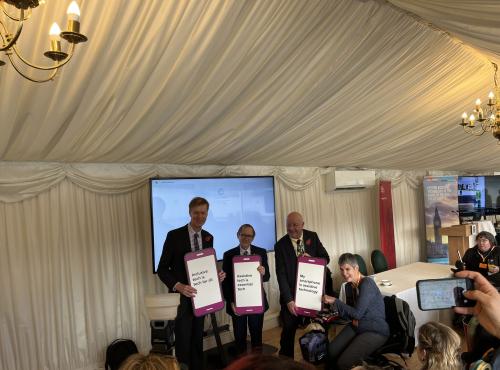Party Manifestos Review - Delivering Accessible Transport
Whoever wins the General Election, one of the disability rights issues requiring the fresh thinking that a new government can offer is inaccessible transport.
According to research by the Motability Foundation, disabled people take 38% fewer journeys than non-disabled people. This transport accessibility gap has not shown any signs of narrowing in the past decade – ending half a century of gradual but measurable progress.
Last September Policy Connect launched the Accessible Transport Policy Commission to help drive further change. Chaired by Baroness Tanni Grey-Thompson, the Commission is made up of a cross-party group of MPs and Peers who share a commitment to eliminating barriers to travel for disabled people.
It is part of the National Centre for Accessible Transport (ncat), which was set up with a £20 million grant from the Motability Foundation and is managed by a consortium of organisations that includes Policy Connect.
Even in the maelstrom of the General Election campaign, many of the themes that the Commission has explored in its first few months have bubbled to the surface.
ncat recently conducted a survey of 425 disabled people about their experiences of local transport. The survey found that their top three priorities were making sure they could navigate pavements and streets safely and easily (chosen by 78% of respondents), improving access to buses, bus stops and trains (53%), and boosting connectivity between different modes of transport (49%).
How do the policy commitments of Britain’s political parties compare to the priorities outlined by disabled people?
Each of the manifestos released by the Conservatives, Labour, and the Liberal Democrats addresses these concerns. However, some address the challenges more directly than others.
The most explicit policy proposals are available in the Conservative Party manifesto, which retains the last government's promise to "make this country the most accessible place in the world for people with disabilities to live, work and thrive".
The manifesto further promises to give councils the power to ban pavement parking to make it easier for older and disabled pedestrians to navigate the streets. The Conservatives also plan to improve accessibility at 100 train stations over the next Parliament and provide better support to people who have a guide or assistance dog.
The biggest commitment regarding accessible transport in the Labour Party's manifesto is part of its proposed reform of the UK's railway network. This confirms its intention to make accessibility one of the key organising principles of Great British Railways – a new national body to manage the UK's rail network – and create a "tough new passenger watchdog" to drive up standards.
The Liberal Democrats say that they would "greatly improve" the accessibility of the railway network through the existing Department for Transport’s Access for All programme.
Other commitments that aim to make the transport system more inclusive and easier for all passengers will also benefit many disabled people. For example, all the parties pledge to keep bus fares low to control the cost of travel for passengers on low incomes.
Each also recognises that active travel should be a priority for the next government, with the Liberal Democrats committing to producing a new strategy that would lead to new cycling and walking networks across the country.
Nevertheless, the documents fail to address some of the most significant barriers to accessible travel. These omissions include the challenges posed in the aviation sector where poor aircraft design and inadequate assistance from staff regularly expose disabled people to all sorts of indignities and risks to their wellbeing. There is also the severe underfunding of community transport services on which many rely to engage in everyday activities such as going to the shops, attending hospital appointments and commuting to school or work.
The manifestos confirm that broad swathes of transport policy will in future be made outside Whitehall. For example, the Liberal Democrats and Labour both would give more powers and resources to local authorities so they can design transport services to meet the needs of their communities. Labour wants to empower metro mayors "to create unified and integrated transport systems” in the regions under their control.
Responsibility for removing barriers to travel for disabled people will continue to shift in coming years from Westminster and Whitehall to local and regional leaders.
The manifestos offer glimpses of what an incoming government might do help close the transport accessibility gap. But all fall short of offering a clear plan to tackle this enduring injustice.
The task awaiting our Commission in the next parliament will be to press policymakers across the UK to take urgent and more comprehensive action towards a transport system that works for everyone.



